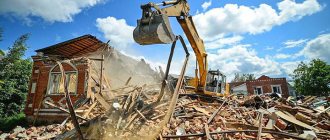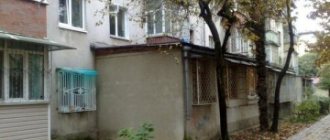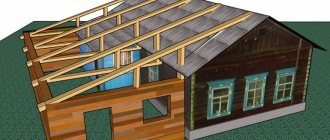Often, citizens who own land plots believe that since the plot is in their ownership, it means they can build any real estate on it. However, this is not at all true. In this article we will examine in detail the question of what such a judgment can lead to and how its negative consequences can be prevented. So, you own a plot of land on which you want to build, for example, a residential building. According to the law, every citizen must notify the local government about such intentions before starting construction, and upon completion, notify the same administration about the completion of construction, attaching a technical plan for the constructed facility. This is a moment you can't miss. It is necessary to build real estate and notify government authorities so that the construction is not recognized as unauthorized construction.
According to the Civil Code of the Russian Federation, art. 222, not only real estate that was built in the absence of building permits, but also a building erected in violation of town planning and building codes will be considered an unauthorized construction. If the property is recognized as a self-construction, it will not be registered in the cadastral register and the ownership of it will not be registered.
What objects are considered unauthorized construction?
An unauthorized construction in 2021 is considered to be one that:
- Built on a plot of land that was not provided in accordance with the established procedure. The land must be owned or disposed of by persons on the basis of other title documents (lease agreement, purchase and sale agreement, agreement of perpetual use, right of lifelong inheritable possession).
- Built on land on which the construction of a specific type of object is prohibited, i.e. does not allow the type of permitted use.
- Built without obtaining approvals and (or) construction permits from local authorities.
- Has violations of town planning standards, construction rules, fire safety, etc.
Dacha amnesty
This program was developed on the basis of the residential privatization program. That is, for a certain period of time, owners of summer cottages and land plots for individual housing construction could register ownership of their buildings in a simplified manner. At its core, this is the legalization of self-construction.
For a long time, many Russians did not think about bringing the structures on their dacha plots “out of the shadows.” The main disadvantage is that after the right arises, the obligation to pay property tax will arise. Many people don't want to do this!
On the other hand, if the right is alienated legally, then the subject of the transaction will be only land, since the right to it is registered. Buildings cannot be sold/donated/bequeathed. Accordingly, the cost of such a site will be much lower.
Unlike the housing privatization program, the dacha amnesty has its own validity period. In particular:
- You can take advantage of the opportunity to register property rights to a land plot according to a simplified scheme until March 2021;
- You can take advantage of a similar opportunity for illegal construction on this site until March 2021.
The extension occurred in March 2021, when deputies again discussed the possibility of increasing the duration of the program and the prospects for the receipt of tax funds into the budget. Therefore, it was decided to extend the validity period of the simplified procedure.
Important! After receiving an extract from the Unified State Register of Real Estate on the registration of the property right to the building, the owner has the opportunity to independently alienate the right in any legal way. But do not forget about the obligation to pay income tax after the sale and the right to a property deduction.
How to register a self-construction
If the property has the “status” of self-building and is owned or owned by someone, then the state will first give time to eliminate the violations (for example, reduce the area of the building). Violations must be eliminated within a specified period, otherwise the authorized body will issue a demolition order. When a building is not registered, there are two main ways to register it in accordance with the requirements of the law - administratively or judicially.
The first way is to legalize self-construction administratively.
The legalization procedure through the administration is processed “retroactively.”
- To begin with, a notification about the start of construction should be submitted to the administration with a description of the construction parameters (height, number of floors, area, etc.).
- If no objections are received to the notification, it is necessary to conclude an agreement with the cadastral engineer for the implementation of the technical plan.
- Next, a formal notification of completion of construction is sent to the administration along with a technical plan.
If there are no violations, the local government authority will send you a notification about the compliance of the constructed facility with urban planning standards and transfer the documents to Rosreestr. But it should be said right away that you can receive a refusal from the executive body at any stage of the above. This method is suitable for those who have built real estate on the lands of individual housing construction or private plots. For SNT there is a “dacha amnesty”, which makes it possible to register a residential building without notification of construction. You can register your rights under a simplified procedure until March 1, 2021 .
The second way is to legalize unauthorized construction through the court
The basis for transferring the case to court is the refusal of local governments to formalize the unauthorized construction. The court will order a mandatory forensic examination, which will confirm the capital construction of the building, its compliance with the requirements of GOSTs and SNiPs, etc. But you can order an independent construction expert yourself before filing a lawsuit in order to find out in advance about the presence of violations and correct them. Sometimes the conclusion of a pre-trial examination is sufficient for the court and there will be no need for a judicial examination. When you already have in your hands a refusal from a government agency, a technical passport for a capital construction project (CFU), an extract from the Unified State Register of Land Registers for a land plot, then you should then competently draw up a statement of claim, in which you must take into account that:
- the land plot must be owned, inherited for life, permanent (indefinite) use;
- the building must comply with the category of land and type of permitted use (VR);
- confirmation that a specific building does not violate the rights of third parties (neighbors) (the norms for indentation during construction are observed, etc.).
- the reasons for going to court should be indicated, i.e. state the reason for unauthorized construction or the grounds for refusal of a construction permit.
Although both methods are not fast, but if the construction is important to you and in the future you plan to make various transactions with it, then you should be patient. If there are adequately substantiated reasons why the squatter building was erected, the court usually rules in favor of the plaintiff.
Pavilion without a passport
Our story began in the courts of the Krasnodar region, and ended in the capital, in the Supreme Court. And given that we have a lot of unauthorized buildings of various sizes and purposes in our country, such an explanation from highly qualified judges can be very useful to a considerable number of citizens.
The story began a long time ago - in the late 90s. Then the local administration leased a plot of land for use as a shopping pavilion. But there was an important caveat - the pavilion was not supposed to be a permanent structure. Over the years, the tenants changed, until the next tenant decided that he wanted to have a permanent building. He built a reinforced concrete foundation, erected brick walls and went to court to recognize ownership of the property. The regional court did not see anything illegal in this and satisfied the demand. But the Supreme Court did not agree with this decision and stated that the will of the owner must be taken into account.
And now the details of the dispute. In 1996, the administration leased the site to a certain local company for five years. The documents said: “For the installation and operation of a trade pavilion.” The tent was built and the lease was extended.
In 2003, the land was given to a certain citizen on lease from the administration for three years “to accommodate a trade pavilion made of lightweight structures.” But the citizen reconstructed the facility: he made a foundation from a reinforced concrete slab and erected brick walls. The new tenant eventually came to the conclusion that his, now permanent, pavilion had become real estate. And if so, he asked the court to recognize ownership of this building.
The one who erected an unauthorized structure does not acquire actual ownership of it.
At first, this request was considered by the Prikubansky District Court of Krasnodar. The court rejected the citizen's claim. In its decision, the district court indicated that the land plot was provided to the plaintiff for three years for the “temporary placement of a trade pavilion made of lightweight structures.” The plaintiff does not have any permitting documentation for capital construction required in such cases. And he is not the owner of the land plot.
According to the court, this capital structure is a real unauthorized construction, erected without the appropriate permission. As a result, the district court wrote in its decision that the citizen violated the legal rights and interests of the owner of the land plot - the municipality of Krasnodar.
The offended owner of the pavilion went to challenge the decision. And he succeeded. The Krasnodar Regional Court overturned the decision and adopted a new decision. Namely, it satisfied the claims. In its decision, the regional court stated verbatim the following: on the basis of the purchase and sale agreement for the shopping pavilion, the plaintiff became its owner, carried out reconstruction, after which the pavilion began to have “features of real estate.”
Thus, according to the appeal, it is quite possible for a citizen to recognize the right of ownership of the pavilion as a newly created thing. And he referred to articles 218-219 of the Civil Code of the Russian Federation.
The administration of the municipality of the city of Krasnodar was already indignant at this decision. And she filed a cassation appeal to the Supreme Court. There they examined the complaints and stated that the person who erected the unauthorized structure does not acquire ownership of it and does not have the right to dispose of it. The Supreme Court reminded its colleagues about another article of the Civil Code, which is more suitable for this case - Article 222.
And this article says that if a site is leased for the construction of temporary buildings or easily erected structures, then there is no reason to recognize ownership of the “actually erected capital type structure.” By concluding a lease agreement, the owner must clearly express his will to erect buildings of a specific type.
According to the Supreme Court of the Russian Federation, when considering the issue of recognizing the ownership of an unauthorized object, the will of the owner of the land plot is of particular importance. Our hero received land lease for the temporary placement of a trade pavilion made of lightweight structures. Without the right of capital construction and without corresponding permitted use. The right of ownership of newly created real estate is recognized only if all legal norms are observed during its creation. Consequently, we are no longer talking about unauthorized construction. Therefore, the Supreme Court of the Russian Federation canceled the appeal ruling and upheld the decision of the trial court.
Fines for unauthorized construction 2021
The Code of Administrative Offenses of the Russian Federation established monetary penalties for the construction of real estate without permits
- For citizens from 2,000 to 5,000 rubles
- For officials from 20,000 to 50,000 rubles
- For legal entities from 500,000 to 1,000,000 rubles
When registering unauthorized construction, penalties cannot be avoided; they will have to be paid in any case, but the consequences may be more global. The further development of events is the liquidation of real estate. In order to avoid such consequences, as well as for the purposes of the legitimate use and operation of the property, we strongly recommend that you consider the issue of legalizing unauthorized construction.
How to legitimize, legalize self-construction if the object is included in the lists of applications 819 PPM?
Decree of the Moscow Government No. 819 of December 11, 2013 is a key document regulating the fight against unauthorized buildings in the capital. 819 PPM, among other things, provides a list of structures recognized as unauthorized construction. In the latest version of the resolution, the appendices indicate more than 350 objects subject to demolition.
What do you need to know if you intend to fight for your property and prevent it from being demolished?
- demolition of unauthorized buildings is possible only by court decision if you have registered ownership (we can help with this unresolved issue);
- objects are demolished or partially dismantled by decision of the decree of the Prefecture (if the right is not formalized) or you can do this on your own, because it's more profitable;
- the owner of the building has the right to take measures to legalize unauthorized construction - a period of 6 months to 3 years is allotted for this. The main thing is to initiate this procedure on time (within a month after receiving the protocol from the GIN inspector) and not to create obstacles for yourself by trying to scandalize or threaten employees of the State Real Estate Inspectorate , etc.;
- authorities are obliged to notify the owner of the property about the decision to demolish the property, but we will not allow you to incur such costs if you contact us to resolve the issue;
- if the owner of the property could not be found, information about the upcoming demolition of the building is published in the media;
- The one who erected it, as well as the legal holder of the land plot on which the unauthorized building is located, has the right to demolish or legalize an unauthorized building. The authorities can do this with the help of the Prefecture or the District Government, but the bill for dismantling services is usually higher than if this is done voluntarily.
As a rule, property owners in Moscow prefer not to dismantle, but to legalize their properties, because the demolition of such buildings means significant financial losses. In this case, the first priority is to exclude the object from the 819 MRP.
There are several ways to achieve this:
- file a lawsuit to declare it illegal to include an object in the list of unauthorized buildings, but even if you win the court and the object is recognized as erected with the necessary documents, it will be difficult to exclude it from 819 PPM and remove all restrictions on registration actions, because city departments simply do not recognize self-built objects;
- legalize self-construction by paying a fine and receiving a positive decision from the Urban Planning Land Commission in the form of an extract from the minutes of the meeting of the State Land Committee.
Does it take long to read the description? Call +7 , we will immediately answer all questions. Write a request to [email protected] with a clearly described essence of the question or task, we will answer.
Registration of ownership
After receiving a positive court decision, you must contact the Rosreestr office to register ownership. You need to bring with you:
- passport;
- court decision;
- statement.
The authority charges a state fee for consideration of the application and registration, so it is also necessary to submit a receipt for payment of the fee. Otherwise, the registrar will return the application.
If Rosreestr has no questions about the contents of the documents, the registrar will make a positive decision and enter the object into the Unified State Register of Real Estate. The applicant will receive a registration certificate, which proves ownership of the unauthorized construction.
How long does it take to legitimize and legalize unauthorized construction?
As a rule, it is possible to legalize an object within 3 to 6 months. But in complex cases, the procedure can take a longer time. We are ready to advise you free of charge on the cost and approximate time frame for legalizing turnkey self-construction in Moscow. a copy by email [email protected]
- documents for real estate (for an object recognized as self-construction);
- a copy of the GIN inspector's report.
To clarify the list of documents for consideration, please contact the contacts listed on the website.
How is the fine calculated when legalizing unauthorized construction?
Administrative fines for unauthorized construction from 2021 are assessed based on the cadastral value of the land plot, the number of violations in terms of the site’s VRI, the necessary classifiers for the intended use of buildings, and the number of increased meters. For individuals, the fine is 0.5-1% of this figure; for officials - 1-1.5% of the cadastre; for legal entities - 1.5-2%. On average, fines for unauthorized construction in Moscow range from 150 thousand rubles to 3.5 million rubles, but this is not an axiom . For large footage and complex situations of unauthorized construction, a formula is used to calculate the fine using a large number of criteria and factors, taking into account all the circumstances of the occurrence of unauthorized construction. We will help you officially reduce the fine by 20-35%.











